LIMA, Peru -- A Peruvian judge on Thursday ordered ousted President Pedro Castillo to remain in custody for 18 months, approving a request from authorities for time to build their rebellion case against him.
The judge's decision came a day after the government declared a police state as it struggles to calm violent protests that have led to at least 14 deaths. The Ministry of Health reported 40 people were hospitalized for injuries suffered during the civil unrest.
The protests erupted after Castillo was voted out of power by lawmakers last week, following his attempt to dissolve Congress ahead of a third impeachment vote. The latest political crisis has only deepened the instability gripping the country, which has had six presidents in as many years.
Judge Cesar San Martin Castro's ruling came days after Congress stripped Castillo of the privilege that keeps Peru's presidents from facing criminal charges.
Castillo and his legal team refused to participate in Thursday's virtual hearing, arguing it lacked "minimum guarantees." He was represented by a public defender, who said the judge's decision will be appealed.
Peru's Supreme Prosecutor Alcides Chinchay said in court Thursday that Castillo faces at least 10 years in prison for the rebellion charge.
Meanwhile, a large group of protesters -- and police in riot gear -- gathered in central Lima Thursday evening. The government also imposed a curfew in at least 15 communities, as allowed by the nationwide emergency declaration issued Wednesday.
The protesters were demanding Castillo's freedom, the resignation of President Dina Boluarte, and the immediate scheduling of general elections to pick a new president and members of Congress. They have burned police stations, taken over an airstrip used by the armed forces and invaded the runway of the international airport in Arequipa, a gateway to some of Peru's tourist attractions.
Thousands of tourists have been affected by the protests. The passenger train that carries visitors to Machu Picchu suspended service, and roadblocks on the Pan-American Highway stranded tractor trailers for days, spoiling food bound for the capital.
In Cusco, a top tourist destination, people were stuck Thursday at hotels and the airport.
"I was about to return to Ecuador on Monday, and unfortunately, they told us that all flights were canceled due to the protests," said Karen Marcillo, 28, who has had to sleep at the Teniente Alejandro Velasco Astete airport in Cusco.
While in office, Castillo spent much of his time defending himself against attacks from an adversarial Congress and investigations ranging from corruption to plagiarism. Now, it remains unclear whether Boluarte -- once his running mate and vice president -- will get a chance to govern. Just like Castillo, she is a newcomer to politics without a base in Congress.
"She's doing a good job right now," said Cynthia McClintock, a political science professor at George Washington University who has studied Peru extensively. "But it's a big challenge."
While some protesters "seem to want kind of instability at any cost," McClintock said, others saw Castillo's ouster as an opening to express simmering grievances, such as deep inequality, poverty and lack of public services.
Boluarte, though, may be given some breathing room by lawmakers seeking to keep their jobs. They cannot pursue re-election and would be jobless if a general election for Congress is scheduled, as protesters want.
Boluarte on Wednesday sought to placate the protesters by saying general elections could potentially be scheduled for December 2023, four months earlier than the timing she had proposed to Congress just a few days earlier.
All of the protest-related deaths have occurred in rural, impoverished communities outside Lima that are strongholds for Castillo, a political neophyte and former schoolteacher from a poor Andean mountain district.
In Andahuaylas, where at least four people have died since the demonstrations began, no soldiers were on the streets Thursday despite the government declaration allowing the armed forces to help maintain public order.
Information for this article was contributed by Franklin Briceno, David Pereda and Gonzalo Solano of The Associated Press.
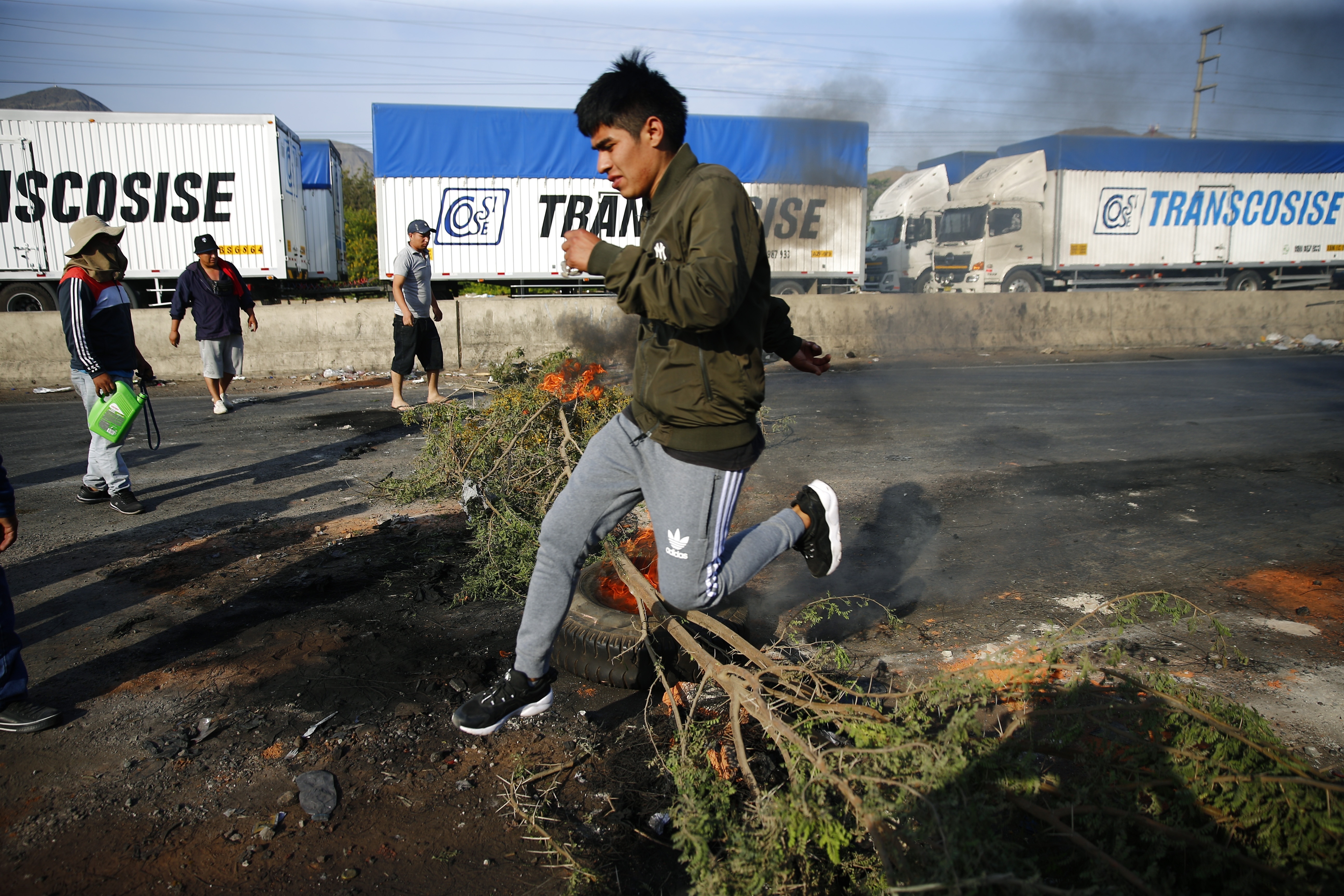 Supporters of ousted Peruvian President Pedro Castillo block the Pan-American North Highway to protest his detention in Viru, Peru, Thursday, Dec. 15, 2022. Peru's new government declared a 30-day national emergency on Wednesday amid violent protests following Castillo's ouster, suspending the rights of "personal security and freedom" across the Andean nation. (AP Photo/Hugo Curotto)
Supporters of ousted Peruvian President Pedro Castillo block the Pan-American North Highway to protest his detention in Viru, Peru, Thursday, Dec. 15, 2022. Peru's new government declared a 30-day national emergency on Wednesday amid violent protests following Castillo's ouster, suspending the rights of "personal security and freedom" across the Andean nation. (AP Photo/Hugo Curotto)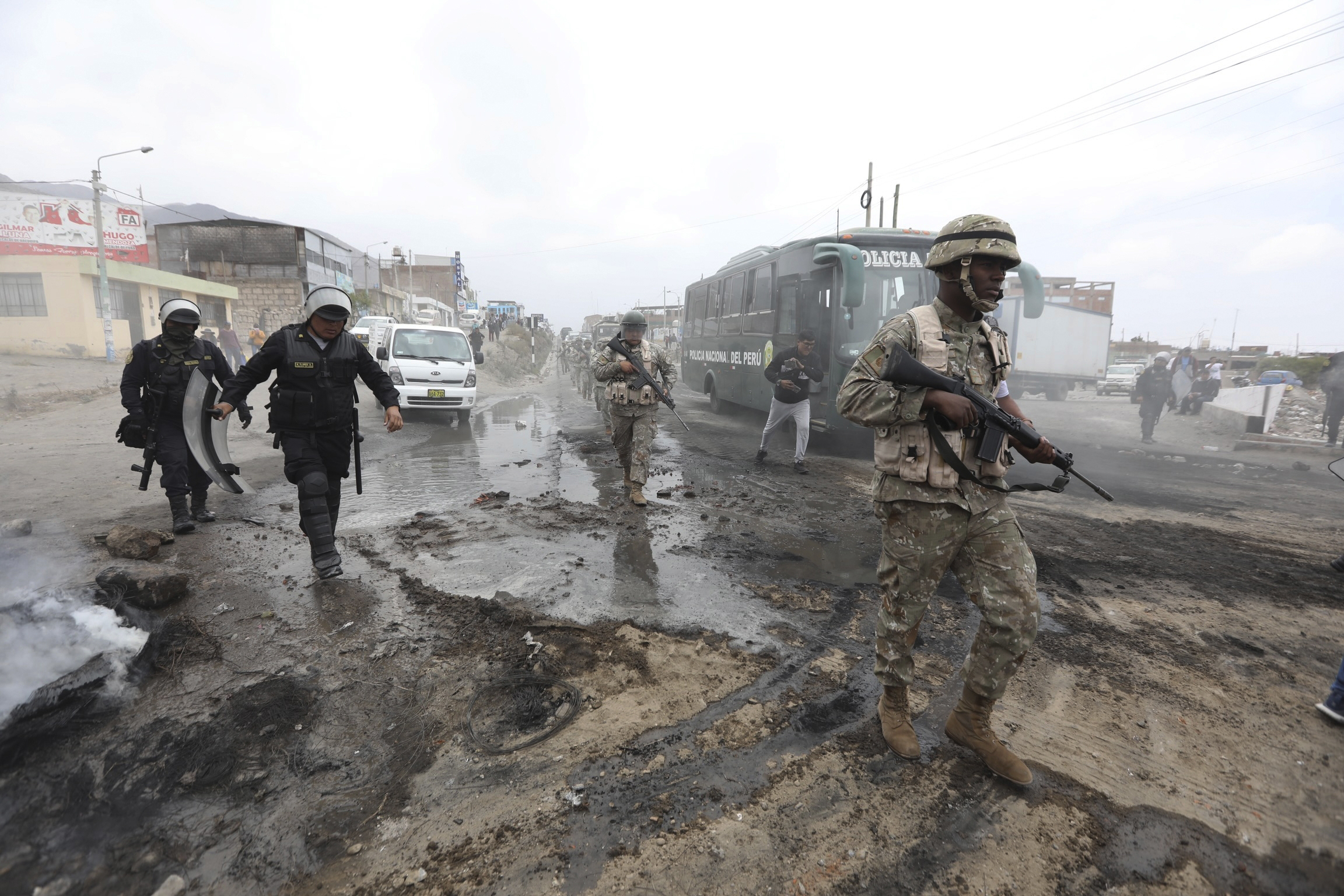 Soldiers and police prepare to clear the highway of debris placed by supporters of ousted Peruvian President Pedro Castillo protesting his detention in Arequipa, Peru, Thursday, Dec. 15, 2022. Peru's new government declared a 30-day national emergency on Wednesday amid violent protests following Castillo's ouster, suspending the rights of "personal security and freedom" across the Andean nation. (AP Photo/Fredy Salcedo)
Soldiers and police prepare to clear the highway of debris placed by supporters of ousted Peruvian President Pedro Castillo protesting his detention in Arequipa, Peru, Thursday, Dec. 15, 2022. Peru's new government declared a 30-day national emergency on Wednesday amid violent protests following Castillo's ouster, suspending the rights of "personal security and freedom" across the Andean nation. (AP Photo/Fredy Salcedo)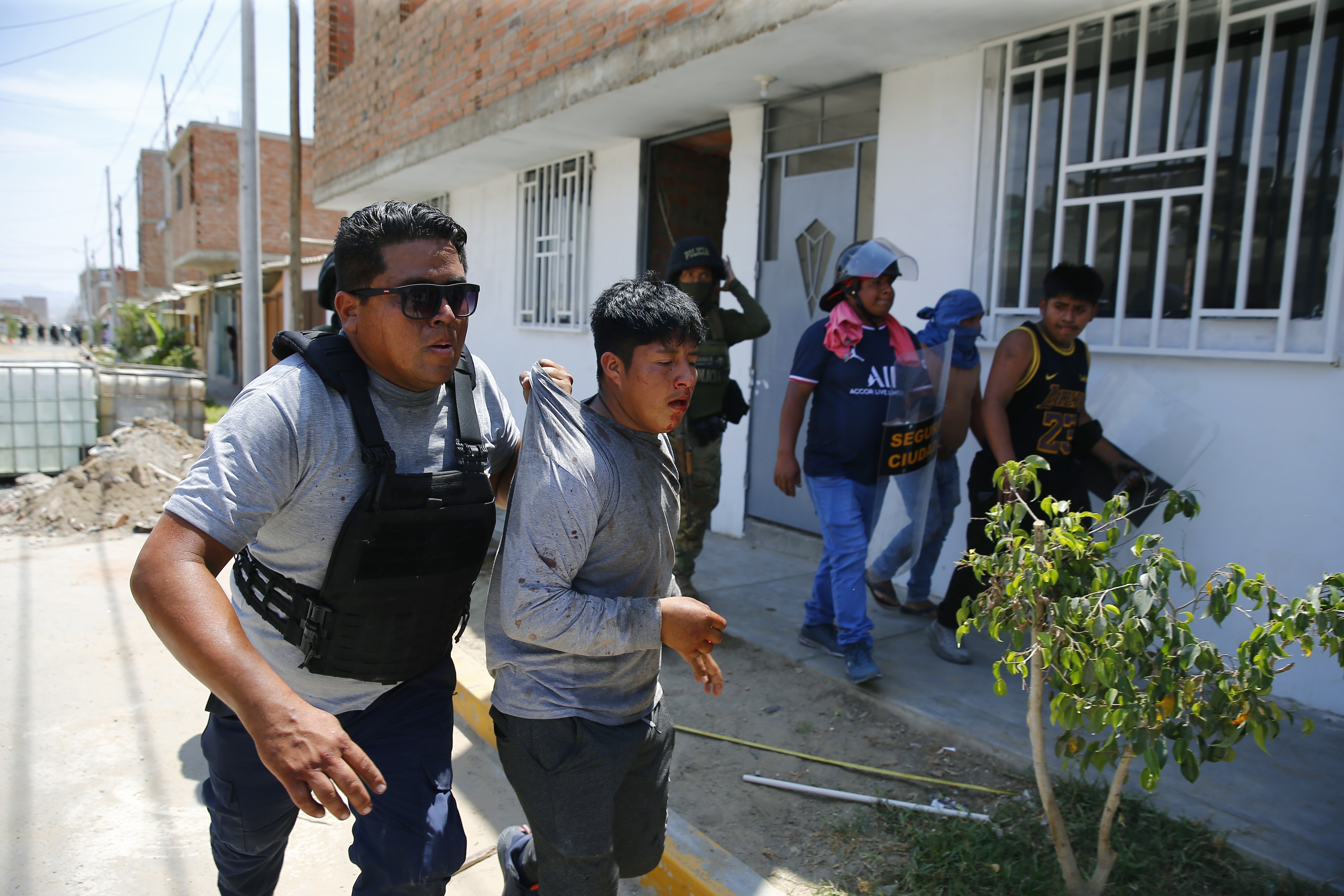 Security forces detain a supporter of ousted Peruvian President Pedro Castillo, during a protest against Castillo's detention, on the Pan-American North Highway in Chao, Peru, Thursday, Dec. 15, 2022. Peru's new government declared a 30-day national emergency on Wednesday amid violent protests following Castillo's ouster, suspending the rights of "personal security and freedom" across the Andean nation. (AP Photo/Hugo Curotto)
Security forces detain a supporter of ousted Peruvian President Pedro Castillo, during a protest against Castillo's detention, on the Pan-American North Highway in Chao, Peru, Thursday, Dec. 15, 2022. Peru's new government declared a 30-day national emergency on Wednesday amid violent protests following Castillo's ouster, suspending the rights of "personal security and freedom" across the Andean nation. (AP Photo/Hugo Curotto)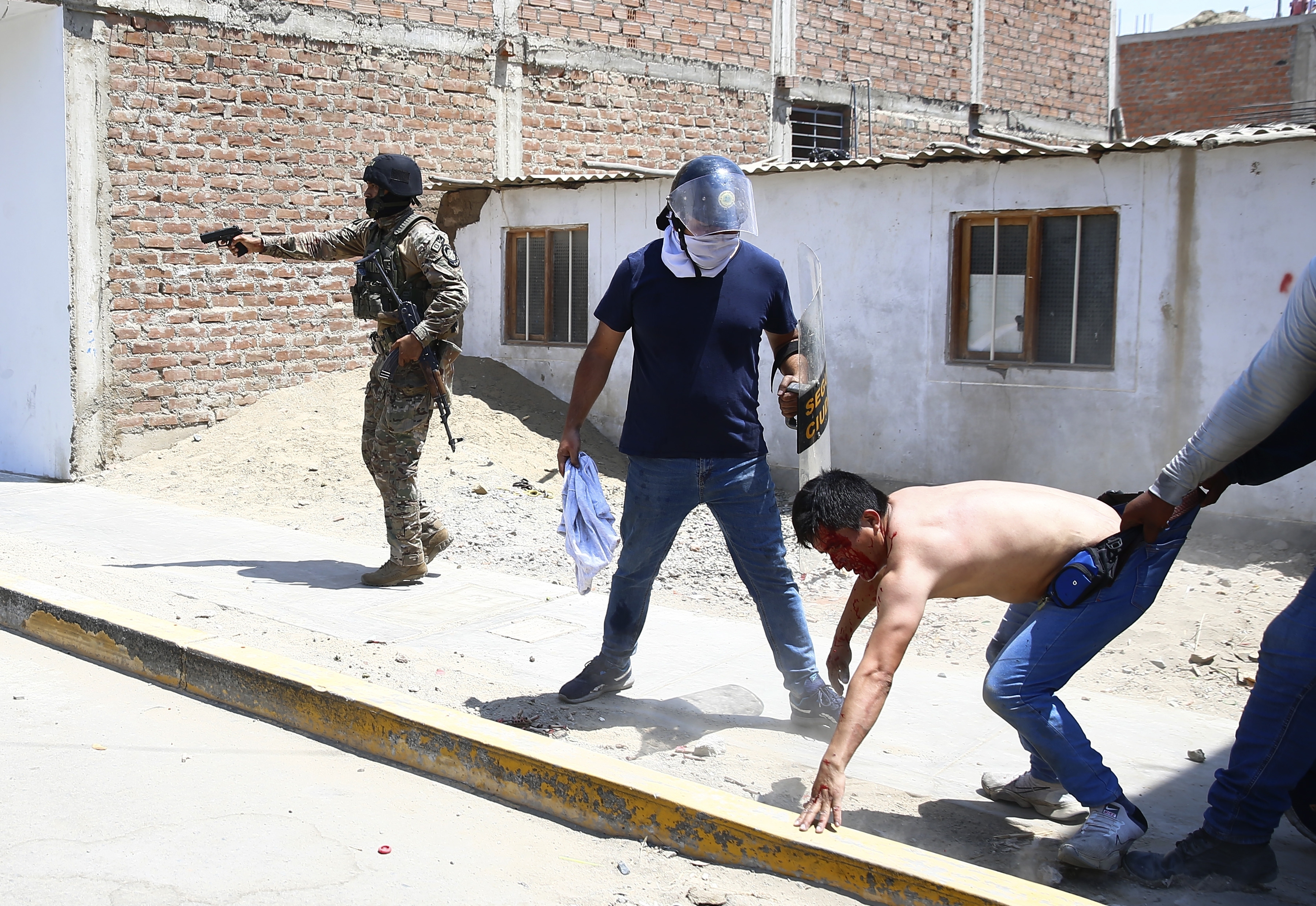 Security forces detain a supporter of ousted Peruvian President Pedro Castillo, on the Pan-American North Highway in Chao, Peru, Thursday, Dec. 15, 2022. Peru's new government declared a 30-day national emergency on Wednesday amid violent protests following Castillo's ouster, suspending the rights of "personal security and freedom" across the Andean nation. (AP Photo/Hugo Curotto)
Security forces detain a supporter of ousted Peruvian President Pedro Castillo, on the Pan-American North Highway in Chao, Peru, Thursday, Dec. 15, 2022. Peru's new government declared a 30-day national emergency on Wednesday amid violent protests following Castillo's ouster, suspending the rights of "personal security and freedom" across the Andean nation. (AP Photo/Hugo Curotto)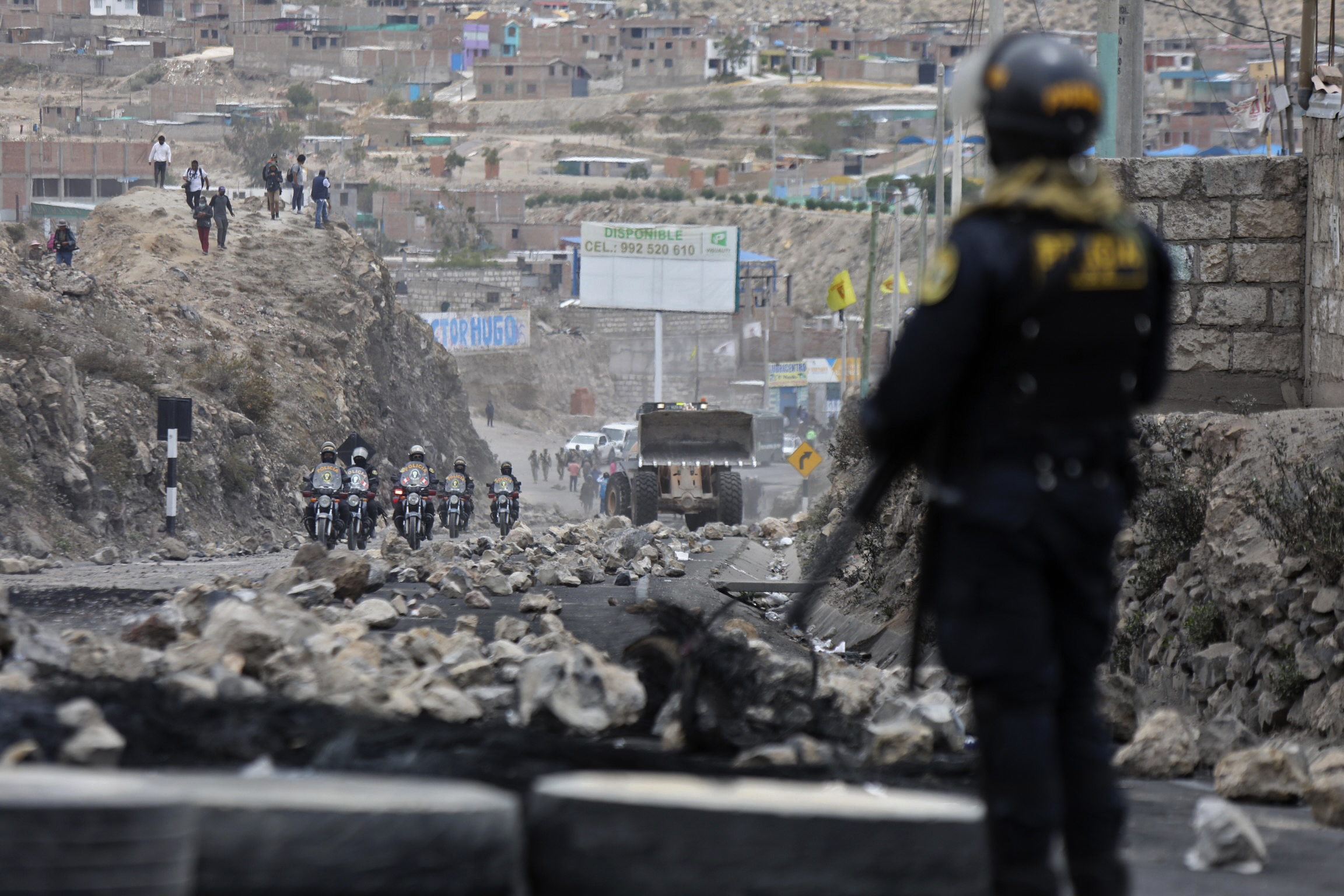 Police arrive to clear debris from a highway, placed by supporters of ousted Peruvian President Pedro Castillo protesting his detention in Arequipa, Peru, Thursday, Dec. 15, 2022. Peru's new government declared a 30-day national emergency on Wednesday amid violent protests following Castillo's ouster, suspending the rights of "personal security and freedom" across the Andean nation. (AP Photo/Fredy Salcedo)
Police arrive to clear debris from a highway, placed by supporters of ousted Peruvian President Pedro Castillo protesting his detention in Arequipa, Peru, Thursday, Dec. 15, 2022. Peru's new government declared a 30-day national emergency on Wednesday amid violent protests following Castillo's ouster, suspending the rights of "personal security and freedom" across the Andean nation. (AP Photo/Fredy Salcedo)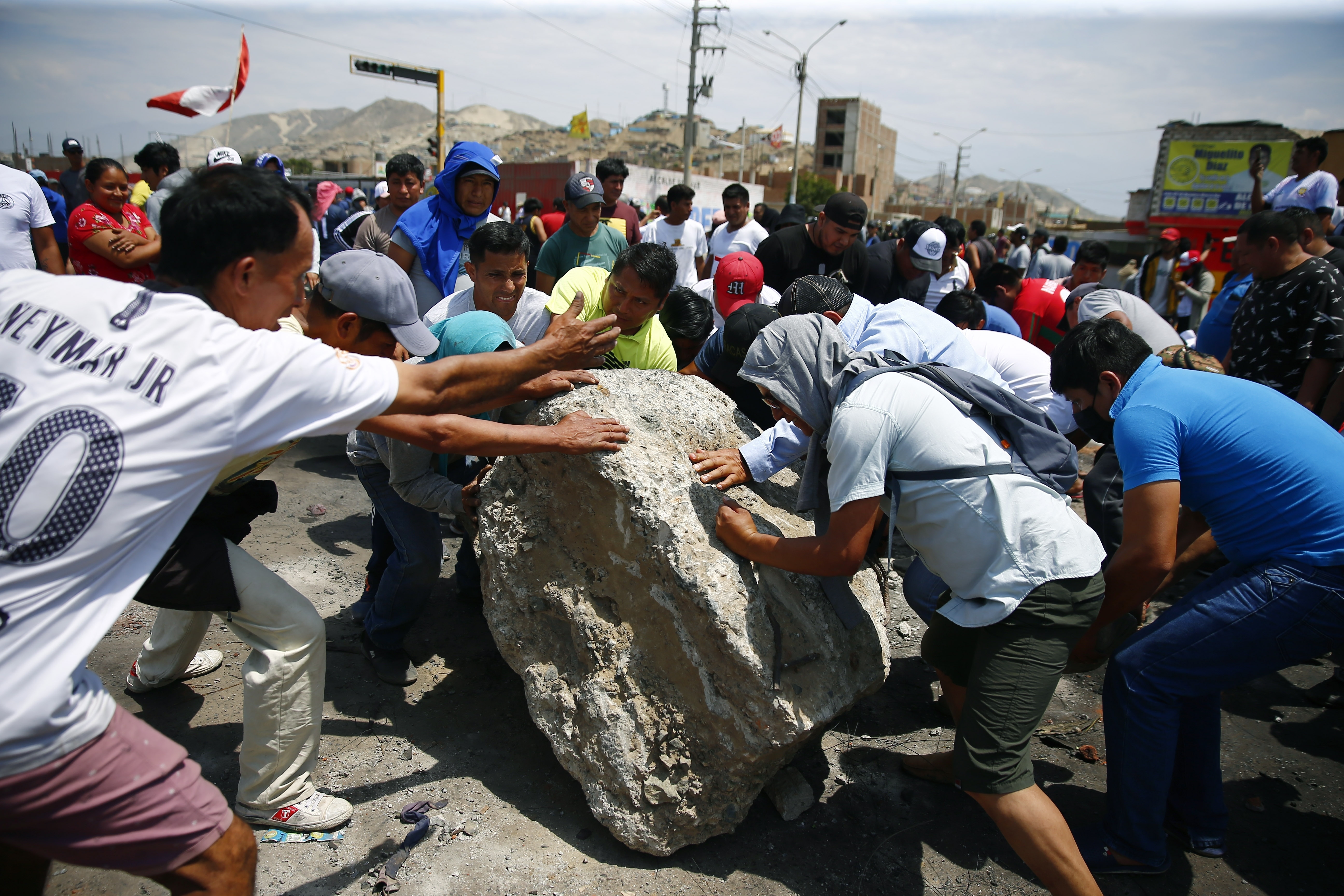 Supporters of ousted Peruvian President Pedro Castillo work together to roll a boulder onto the Pan-American North Highway during a protest against his detention, in Chao, Peru, Thursday, Dec. 15, 2022. Peru's new government declared a 30-day national emergency on Wednesday amid violent protests following Castillo's ouster, suspending the rights of "personal security and freedom" across the Andean nation. (AP Photo/Hugo Curotto)
Supporters of ousted Peruvian President Pedro Castillo work together to roll a boulder onto the Pan-American North Highway during a protest against his detention, in Chao, Peru, Thursday, Dec. 15, 2022. Peru's new government declared a 30-day national emergency on Wednesday amid violent protests following Castillo's ouster, suspending the rights of "personal security and freedom" across the Andean nation. (AP Photo/Hugo Curotto)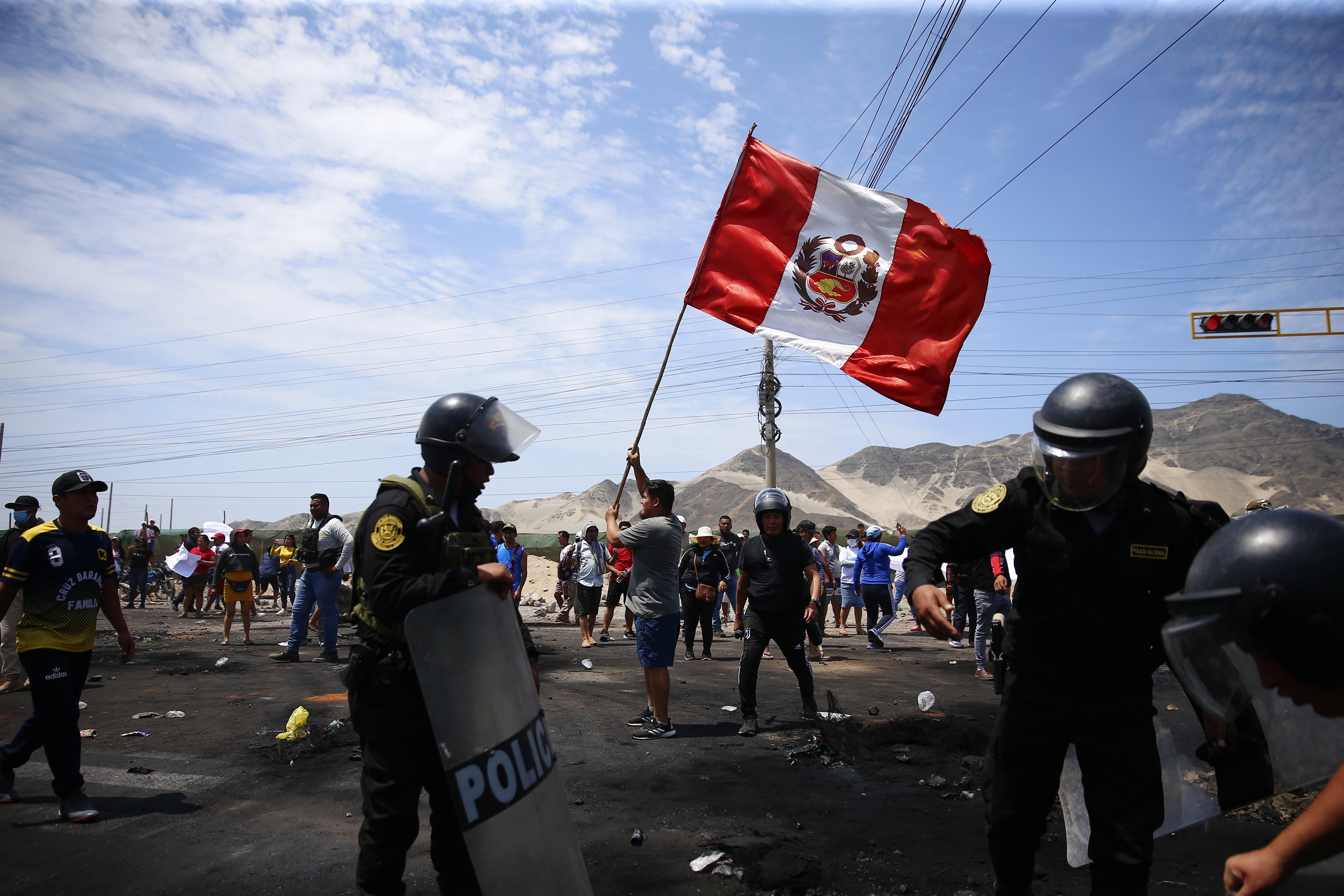 Supporters of ousted Peruvian President Pedro Castillo protest on the Pan-American North Highway while police officers arrive to clear debris, in Chao, Peru, Thursday, Dec. 15, 2022. Peru's new government declared a 30-day national emergency on Wednesday amid violent protests following Castillo's ouster, suspending the rights of "personal security and freedom" across the Andean nation. (AP Photo/Hugo Curotto)
Supporters of ousted Peruvian President Pedro Castillo protest on the Pan-American North Highway while police officers arrive to clear debris, in Chao, Peru, Thursday, Dec. 15, 2022. Peru's new government declared a 30-day national emergency on Wednesday amid violent protests following Castillo's ouster, suspending the rights of "personal security and freedom" across the Andean nation. (AP Photo/Hugo Curotto)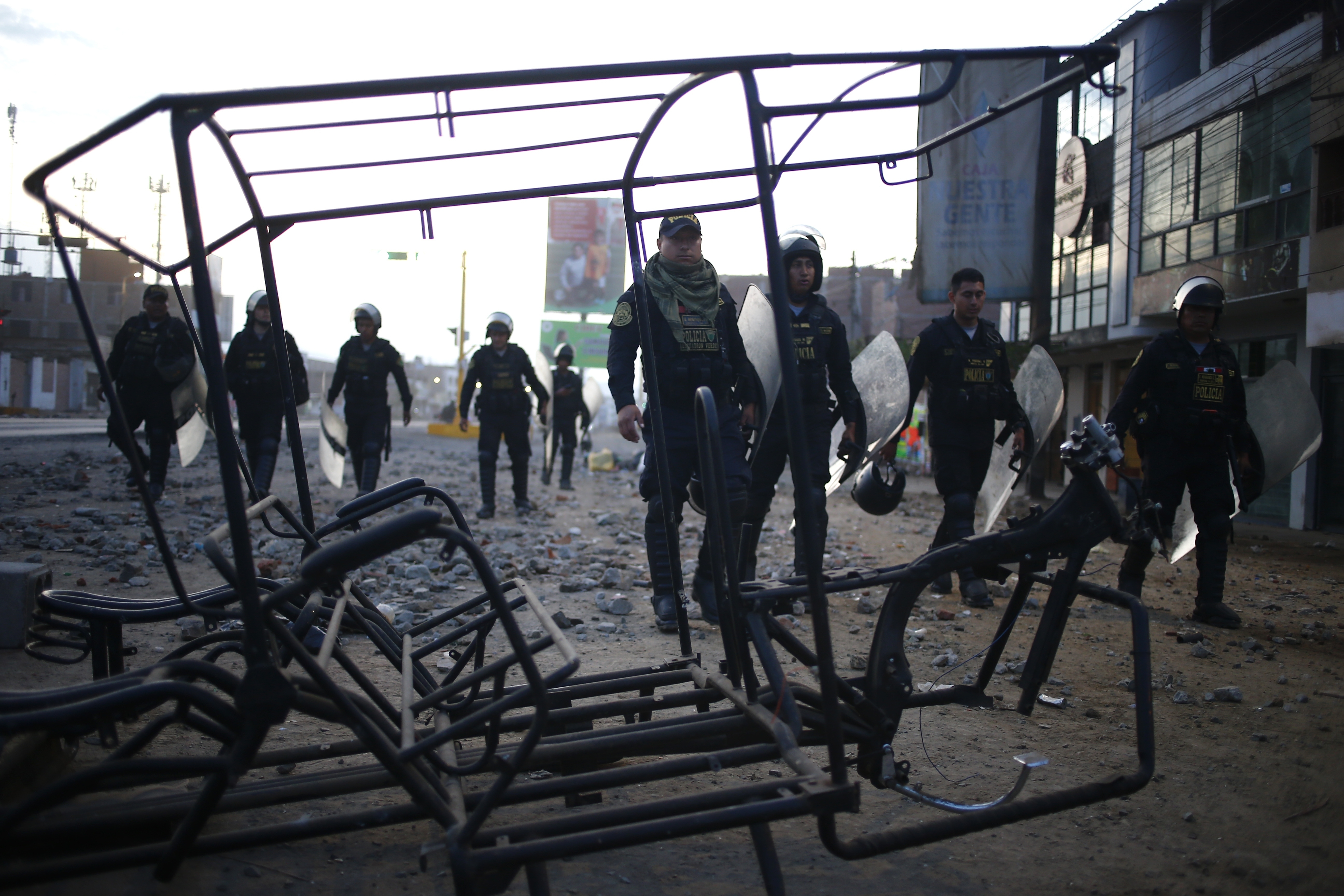 Police walk by a charred moto-taxi frame left by people protesting the detention of President Pedro Castillo, on the Pan-American North highway in Viru, Peru, Thursday, Dec. 15, 2022. Peru's new government declared a 30-day national emergency on Wednesday amid violent protests following Castillo's ouster, suspending the rights of "personal security and freedom" across the Andean nation. (AP Photo/Hugo Curotto)
Police walk by a charred moto-taxi frame left by people protesting the detention of President Pedro Castillo, on the Pan-American North highway in Viru, Peru, Thursday, Dec. 15, 2022. Peru's new government declared a 30-day national emergency on Wednesday amid violent protests following Castillo's ouster, suspending the rights of "personal security and freedom" across the Andean nation. (AP Photo/Hugo Curotto)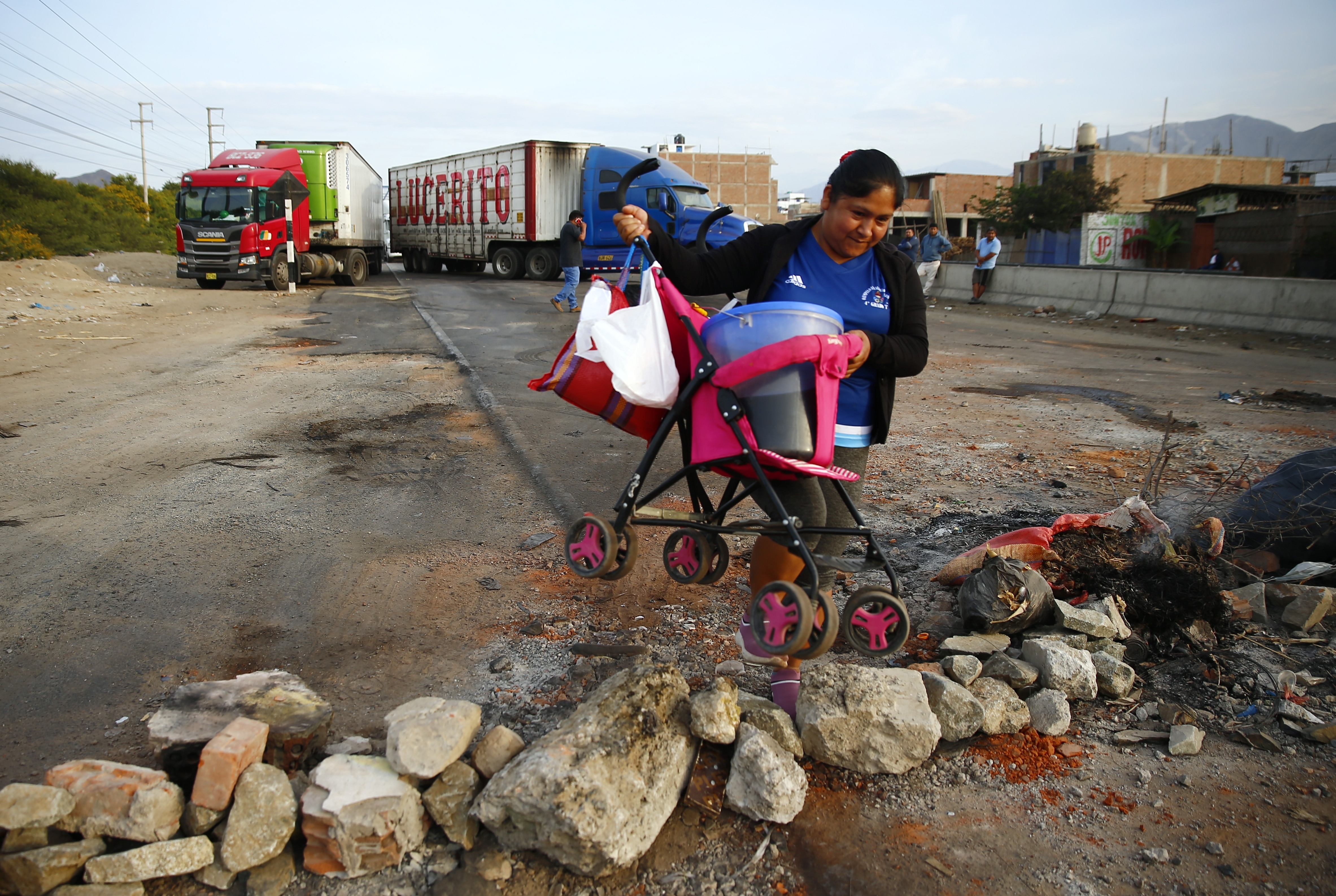 A "chicha" vendor lifts a baby carrier, carrying a bucket of the ice-cold beverage, over a barricade blocking the Pan-American North Highway placed by supporters of ousted Peruvian President Pedro Castillo protesting his detention in Viru, Peru, Thursday, Dec.15, 2022. Peru's new government declared a 30-day national emergency on Wednesday amid violent protests following Castillo's ouster, suspending the rights of "personal security and freedom" across the Andean nation. (AP Photo/Hugo Curotto)
A "chicha" vendor lifts a baby carrier, carrying a bucket of the ice-cold beverage, over a barricade blocking the Pan-American North Highway placed by supporters of ousted Peruvian President Pedro Castillo protesting his detention in Viru, Peru, Thursday, Dec.15, 2022. Peru's new government declared a 30-day national emergency on Wednesday amid violent protests following Castillo's ouster, suspending the rights of "personal security and freedom" across the Andean nation. (AP Photo/Hugo Curotto)